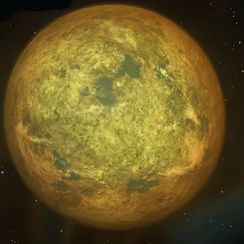
|
This wiki is closed in favour of the new wiki. Information shown is likely to be very out of date. |
Difference between revisions of "Planet Saarbrucken"
m (New Location. Infocard links & Category added) |
m (infocard link & category added) |
||
| Line 19: | Line 19: | ||
Flora is represented primarily by spongy plant forests; fauna by primitive amphibians no larger than cats. Heisenberg scientists theorized that the curious wildlife evolved these adaptations to take advantage of the stifling rain and moisture within the planet's jungles. Conversely, the desert regions are completely devoid of almost all life, save for spectacular displays of flowers and plants that live only a few days. This occurs when rainclouds descend from the mountains and empty their contents on the thirsty sand. | Flora is represented primarily by spongy plant forests; fauna by primitive amphibians no larger than cats. Heisenberg scientists theorized that the curious wildlife evolved these adaptations to take advantage of the stifling rain and moisture within the planet's jungles. Conversely, the desert regions are completely devoid of almost all life, save for spectacular displays of flowers and plants that live only a few days. This occurs when rainclouds descend from the mountains and empty their contents on the thirsty sand. | ||
| − | Saarbrucken was surveyed in the 700's along with the rest of [[Cologne]], and while the clime was considered more pleasant than New Berlin and even Hamburg, the remoteness and lack of immediately viable resources meant that it went ignored until two decades after the Nomad War. In wake of the [[Munich]] disaster, the Bundestag ascertained that Saarbrucken could augment Stuttgart as a secondary breadbasket for the ailing House; the existence of spontaneous flowering plants in the deserts was considered to be a starting point for large-scale terraforming. Additionally, the theory that [[New Berlin|New Berlin's]] White Giant star was only centuries from undergoing supernova was evidently enough of a desired contingency for another Rheinlandic population center. | + | Saarbrucken was surveyed in the [[A.S.|700's]] along with the rest of [[Cologne]], and while the clime was considered more pleasant than New Berlin and even Hamburg, the remoteness and lack of immediately viable resources meant that it went ignored until two decades after the Nomad War. In wake of the [[Munich]] disaster, the Bundestag ascertained that Saarbrucken could augment Stuttgart as a secondary breadbasket for the ailing House; the existence of spontaneous flowering plants in the deserts was considered to be a starting point for large-scale terraforming. Additionally, the theory that [[New Berlin|New Berlin's]] White Giant star was only centuries from undergoing supernova was evidently enough of a desired contingency for another Rheinlandic population center. |
As a result, the government has signed a long-term contract with [[Planetform]] Incorporated for the latter to begin their craft. Only a few thousand colonists currently reside on the planet, coming and going by means of orbital shuttles sourced by orbiting [[Tholey Station|Tholey]]. The near orbit of the planet has seen repeated and concerted assaults from the [[Hessians]] and [[Unioners]] combing the underdeveloped system. | As a result, the government has signed a long-term contract with [[Planetform]] Incorporated for the latter to begin their craft. Only a few thousand colonists currently reside on the planet, coming and going by means of orbital shuttles sourced by orbiting [[Tholey Station|Tholey]]. The near orbit of the planet has seen repeated and concerted assaults from the [[Hessians]] and [[Unioners]] combing the underdeveloped system. | ||
| Line 25: | Line 25: | ||
[[Category: Rheinland]] | [[Category: Rheinland]] | ||
| + | [[Category: Cologne]] | ||
Revision as of 09:49, 23 February 2019
| Planet Saarbrucken | |
| Location | 5C, Cologne |
| Technical information | |
| Docking | No |
| Terrain | Terrestrial |
| Diameter | 9,540 km |
| Mass | 4.42 x 1024 kg |
| Temperature | -27°C to 39°C |
| Escape velocity | 8.15 km/sec |
Saarbrucken is a world with a primitive ecology, only barely suitable for human life. Like Planet New Berlin, it is a place of extremes; much of the planet is arid desert, save for mountainous regions that curiously exhibit a tropical climate. In these regions humidity lingers constantly in the ninetieth percentile or higher, and the air is often thick with a cloying cloak of water vapor.
Flora is represented primarily by spongy plant forests; fauna by primitive amphibians no larger than cats. Heisenberg scientists theorized that the curious wildlife evolved these adaptations to take advantage of the stifling rain and moisture within the planet's jungles. Conversely, the desert regions are completely devoid of almost all life, save for spectacular displays of flowers and plants that live only a few days. This occurs when rainclouds descend from the mountains and empty their contents on the thirsty sand.
Saarbrucken was surveyed in the 700's along with the rest of Cologne, and while the clime was considered more pleasant than New Berlin and even Hamburg, the remoteness and lack of immediately viable resources meant that it went ignored until two decades after the Nomad War. In wake of the Munich disaster, the Bundestag ascertained that Saarbrucken could augment Stuttgart as a secondary breadbasket for the ailing House; the existence of spontaneous flowering plants in the deserts was considered to be a starting point for large-scale terraforming. Additionally, the theory that New Berlin's White Giant star was only centuries from undergoing supernova was evidently enough of a desired contingency for another Rheinlandic population center.
As a result, the government has signed a long-term contract with Planetform Incorporated for the latter to begin their craft. Only a few thousand colonists currently reside on the planet, coming and going by means of orbital shuttles sourced by orbiting Tholey. The near orbit of the planet has seen repeated and concerted assaults from the Hessians and Unioners combing the underdeveloped system.
